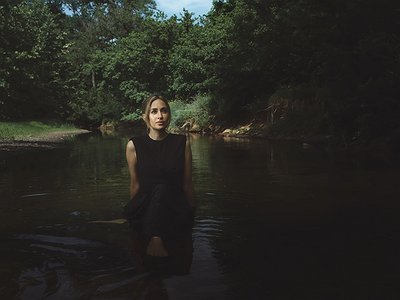Part 2
Collaborations can take on many forms. What role do they play in your approach and what are your preferred ways of engaging with other creatives, including the artists performing your work?
Mass for the Endangered is an example of a piece that features collaboration on lots of levels. I think a strong personal connection is everything in collaboration. The music would not exist without Nathaniel Bellows’s text, which moved and inspired me deeply. Nathaniel’s text is elegant, lyrical, layered in meaning, and immensely singable – in short, it’s ideal for setting to music. But also, Nathaniel is a close friend of mine, and we’d had many, many conversations about the natural world—our mutual love of it, the role it plays in our work, the role it plays in our sense of spirituality—so when I’m setting his words I’m tapping into all of that, and it’s informing the emotion of the music. There was a similar dynamic at play with Gabriel, with whom I’d just become friends before we decided to embark on this project together. You need to have an openness of communication, trust, and a shared sensibility when you go into a project like this, as so much is at stake. I respected and admired Gabriel a great deal; I knew we shared values musically and ethically, personally. So, I had a gut feeling we would be on the same page making this record together. I was right. It’s all about trusting your gut, and then, to a certain extent, knowing when to let go a bit and trust someone else just as much.
How is writing the music and having it performed live connected? What do you achieve and draw from each experience personally? How do you see the relationship between improvisation and composition in this regard?
Writing the music is, of course, an entirely different experience from having it performed live – it’s an abstract imagining experienced by you alone in your brain. Hearing one’s music performed live is humbling, gratitude-inducing, exhilarating, and sometimes horrifying. A live performance is completely out of one’s control, and you have to learn to take joy in that and focus on what you can learn from the experience. I’m not much of an improviser, but I imagine that this would also be a useful attitude to have when improvising—to accept whatever ideas come, and focus not on what didn’t go as well as you hoped, but what you can learn from the experience.
Time is a variable only seldom discussed within the context of contemporary composition. Can you tell me a bit about your perspective on time in relation to a composition and what role it plays in your work?
I’m constantly thinking about time as I compose. My music tends to be phrase-and-development-oriented, as opposed to “here’s a space and some events might or might not happen.” So, I’m very worried about pacing, emotional timing, and delivering a change, an arrival, or some other kind of event at just the right moment. But, of course, this is an impossibly subjective and sometimes exhaustingly quixotic pursuit – I often drive myself crazy second-guessing the timing of a certain gesture, believing, as I tend to do, that a fraction of a second makes all the difference.`
How do you see the relationship between the 'sound' aspects of music and the 'composition' aspects? How do you work with sound and timbre to meet certain production ideas and in which way can certain sounds already take on compositional qualities?
I think of ‘sound’ and ‘timbre’ as part of my compositional process, the way I do melody, harmony and rhythm. The sound, character, timbre of the instruments for which I’m writing influence the compositional ideas I’ll come up with. For me, the different sounds are like characters in a narrative. I think of them as having distinct personalities and dramatic roles. In certain pieces, sound design and electronics are part of my compositional process, but I’m always thinking in terms of atmosphere, narrative, and storytelling.
Our sense of hearing shares intriguing connections to other senses. From your experience, what are some of the most inspiring overlaps between different senses - and what do they tell us about the way our senses work? What happens to sound at its outermost borders?
Over the course of my career I’ve been very directly inspired by visual art, poetry, dance, theatre, etc. – I will see an image and hear something, or read a passage and hear something. So, I definitely believe that all the senses are tied up together in complicated ways. I suppose it’s all about emotional connections, emotional reference points between different sense memories. For me music and olfactory events are the most intensely evocative of memory; I’m not sure why. But that intensely immersive feeling of being transported that we get when smelling, seeing, or hearing something from our past—that’s often what I’m after when writing music.
Art can be a purpose in its own right, but it can also directly feed back into everyday life, take on a social and political role and lead to more engagement. Can you describe your approach to art and being an artist?
I don’t think I have a stance on being an artist, per se, politically or morally. I have a stance on being a thoughtful and responsible human being and I suppose that affects the art that I make. With the album I just released, Mass for the Endangered, Nathaniel (the librettist) and I took on the subject of climate change and endangered wildlife, but it was more for personal reasons – a need to grieve, eulogize, and plead – rather than political ones, per se. We weren’t explicitly striving to galvanize change. I like to make art that gives people space to reflect internally. If that inspires them to act politically in a way that makes the world a better place, great, but I would never presume to have that kind of impact. I’m just trying to communicate in the hopes of making a connection and to express myself in a way that helps me make a little more sense out of the world.
It is remarkable, in a way, that we have arrived in the 21st century with the basic concept of music still intact. Do you have a vision of music, an idea of what music could be beyond its current form?
I think you may be asking about aesthetics, but I’m going to answer this from a more logistical angle. If I could imagine a vision of music beyond its current form, it would be one where listeners have the same breadth of access to music at their fingertips while artists are fairly compensated for the work. Because records sales have disappeared, the real musical dreamers have few ways to support themselves – one either has live on the road performing in the hopes of becoming one of the 3% able to make a living doing that, or find a job in academia, which often favors writing a certain kind of music. The musicians in the cracks between these realities have a very difficult time surviving, let alone dreaming. And we need artists to feel free to dream. We need more governmental support for artists in this country, and we need streaming services to compensate recording artists fairly.






